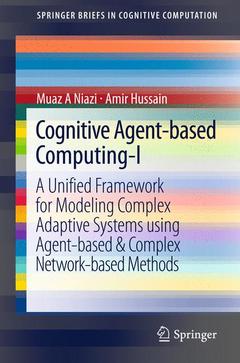Cognitive Agent-based Computing-I, 2013 A Unified Framework for Modeling Complex Adaptive Systems using Agent-based & Complex Network-based Methods SpringerBriefs in Cognitive Computation Series
Auteurs : Niazi Muaz A, Hussain Amir

1. Introduction
1.1 About the Agent Concept
1.2 A Framework for Complex Adaptive Systems
1.3 Modeling CAS
1.4 Motivation
1.5 Aims and Objectives
1.6 Overview of the Briefs
References
2. A Unified Framework
2.1 Overview of the Proposed Framework
2.2 Proposed Framework Levels Formulated in Terms of CAS Study Objectives
2.3 Proposed Framework Levels Formulated in Relation to Available Data Types
2.4 Overview of the Rest of the Parts
2.4.1 Overview of Case Studies
2.4.2 Outline of the Briefs
References
3. Complex Adaptive Systems
3.1 Overview
3.2 Complex Adaptive Systems (CAS)
3.2.1 The Seven Basics of CAS
3.2.2 Emergence
3.3 Examples of CAS
3.3.1 Natural CAS Example 1: CAS in Plants
3.3.2 Natural CAS Example 2: CAS in Social Systems
3.3.3 Artificial CAS Example 1: Complex Adaptive Communication Networks
3.3.4 Artificial CAS Example 2: Simulation of Flocking Boids
References
4. Modeling CAS
4.1 Agent-based Modeling and Agent-based Computing
4.1.1 Agent-oriented Programming
4.1.2 Multi-agent Oriented Programming
4.1.3 Agent-based or Massively Multiagent Modeling
4.1.4 Benefits of Agent-based Thinking
4.2 A Review of an Agent-based Tool
4.2.1 NetLogo Simulation: An Overview
4.3 Verification and Validation of Simulation Models
4.3.1 Overview
4.3.2 Verification and Validation of ABMs
4.3.3 Related Work on V&V of ABM
4.4 Overview of Communication Network Simulators
4.4.1 Simulation of WSNs
4.4.2 Simulation of P2P Networks
4.4.3 Simulation of Robotic Swarms
4.4.4 ABM for Complex Communication Networks Simulation
4.5 Complex Network Modeling
4.5.1 Complex Network Methods
4.5.2 Theoretical Basis
4.5.3 Centralities and Other Quantitative Measures
4.5.4 Centrality Measures
4.5.5 Software Tools for Complex Networks
4.6 Conclusions
References
Index
Date de parution : 10-2012
Ouvrage de 55 p.
15.5x23.5 cm
